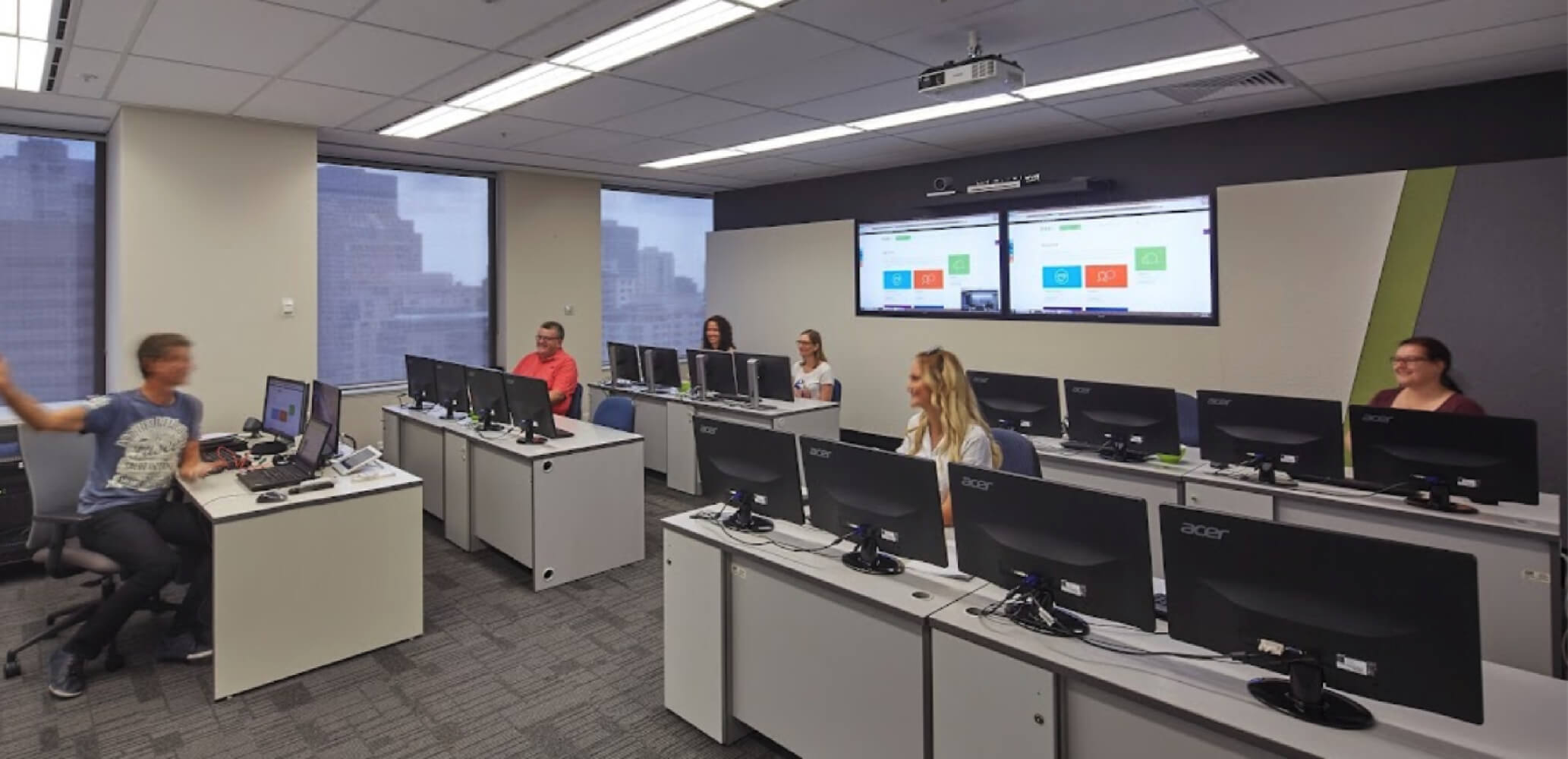In the ever-evolving landscape of education, a remarkable transformation is underway, driven by the powerful synergy of AI and human potential.
Leading this revolution is ChatGPT, an extraordinary AI-powered large language model that is reshaping how we teach and learn by offering personalised and immersive learning experiences.
In this post, we will examine the incredible potential of AI and ChatGPT and how they can be used in education to improve learning experiences. You will discover how it can personalise interactions and cultivate a culture of curiosity and creativity, bringing the classroom of the future to life.
Whether you’re an educator seeking innovative teaching methods or a curious student eager to understand AI’s impact on education, this is the knowledge you don’t want to miss!
Let’s begin!
Are students using ChatGPT?
ChatGPT, the revolutionary AI-powered language model, has not gone unnoticed in the educational landscape. Students, being digital natives, are naturally drawn to the allure of this cutting-edge tool.
But the question arises: Are students really using ChatGPT to augment their academic journey?
Let’s take a look at a poll conducted by Stanford University’s school paper — The Stanford Daily.
The poll result showed a fascinating revelation:
17% of the 4,497 participants agreed to have utilised ChatGPT for their final exams. The numbers don’t stop there; 59.2% of students used the chatbot to generate ideas, create outlines, and form concepts, while 29.1% relied on it for responding to multiple-choice questions. Surprisingly, 7.3% claimed to have submitted modified written work from ChatGPT, while 5.5% submitted unedited material directly from the AI-powered tool.
The above survey is one of many. Hence, we can agree that the answer is a resounding yes! Students are turning to ChatGPT as their trusted resource for personalised assistance with assignments, classwork and even for improving their writing skills.
Its ability to offer instant feedback, creative suggestions, and informative insights has made it an invaluable companion for learners of all ages.
How can AI and ChatGPT be used in education?
Since the emergence of ChatGPT, students and educators alike have quickly embraced the transformative power of this technology to enhance learning outcomes and teaching experiences. By embracing artificial intelligence and leveraging the power of ChatGPT, a new realm of possibilities opens in education.
Let’s explore some key applications of how the Use of ChatGPT in education are reshaping the way we teach and learn.
Personalised Instruction
ChatGPT offers personalised assistance to students by answering questions, clarifying concepts, and providing further explanations. Educators can integrate ChatGPT into online learning platforms or classroom tools to provide on-demand support, complementing classroom discussions with real-time answers.
Virtual Tutoring
ChatGPT acts as a virtual tutor, providing guidance and feedback to students outside regular class hours. It can help with assignments, provide practise exercises, and explain complex topics, serving as a valuable practise tool.
Evaluations
Teachers can use ChatGPT to create assessments by putting in information and context, allowing the chatbot to generate results. While it may require fine-tuning, it can serve as a starting point for making assessments.
Automation
ChatGPT streamlines the grading process, automating the evaluation of assignments and providing feedback to students. This frees up teachers’ time to create engaging academic plans and provide personalised attention to students.
Grammar and Writing Assistance
Educators can use ChatGPT to help students enhance their writing skills by seeking feedback on essays and receiving suggestions for improvement. The chatbot provides instant feedback, enabling students to improve their writing.
Assistance with Assignments
ChatGPT serves as a valuable resource for students seeking help with homework. By posing questions or problems, students receive quick responses and guidance. To further substantiate this point, a study conducted by the Varsity, a student newspaper at the University of Cambridge, discovered that almost half of Cambridge students have used AI to help them complete university coursework.
Improving Writing Skills
Similar to popular writing tools, ChatGPT assists students in enhancing their writing abilities. Students can write sentences and content drafts and request corrections and suggestions for improvement.
Feedback and Editing
Students can use ChatGPT to receive feedback on their essays or assignments, enabling them to make necessary revisions before submitting their work.
Research
ChatGPT can be used as a starting point for research, providing general knowledge and ideas. However, it should be treated as a Wikipedia-type source and not as a citation reference.
If you’re excited about ChatGPT’s possibilities for education, explore our ChatGPT courses to harness their full potential.

Will ChatGPT improve the learning experience for students?
ChatGPT has profoundly affected students’ learning experiences, revolutionising how they engage with educational content and changing what is considered essential for learners.
Here are some key ways in which this powerful tool has transformed the learning landscape:
Personalised Learning
ChatGPT enables personalised learning experiences catering to individual student needs, preferences, and learning styles. By interacting with the AI-powered model, students can receive tailored explanations, targeted practice questions, and adaptive feedback, ensuring they grasp concepts at their own pace.
Instant Feedback and Support
One of the most significant advantages of ChatGPT is its ability to provide instant feedback and support to students. Whether they are stuck on a complex problem, need clarification on a concept, or want assistance with writing assignments, ChatGPT is available 24/7 as a virtual tutor. This real-time support fosters a culture of continuous learning and empowers students to become independent learners.
Creativity and Critical Thinking
ChatGPT encourages creativity and critical thinking among students. Instead of relying on rote memorisation, learners are encouraged to ask thoughtful questions, explore multiple perspectives, and approach problem-solving innovatively. The AI model acts as a brainstorming partner, generating ideas and prompting students to think deeply about their responses.
Access to Information
With ChatGPT, students have access to a vast repository of information and knowledge. This democratisation of knowledge breaks down barriers to learning, providing students from all backgrounds with equal opportunities to explore and expand their understanding of various subjects.
Redefining Assessment
ChatGPT has challenged traditional assessment methods. While multiple-choice questions are still prevalent, educators are now exploring the potential of AI-generated questions that assess higher-order thinking skills. This shift in assessment paradigms encourages students to apply knowledge and critical analysis, moving away from the mere regurgitation of facts.
Flexibility and Convenience
ChatGPT offers unparalleled flexibility and convenience to students. They can access learning materials and support whenever and wherever needed, removing geographical and time constraints. This accessibility fosters continuous learning beyond the confines of the classroom.
Empowering Educators
ChatGPT complements educators’ efforts by providing additional educational resources and support. Teachers can leverage the AI model to enhance their lessons, create engaging content, and gain insights into students’ understanding and progress. This AI-human partnership empowers educators to focus on facilitating meaningful learning experiences.
Challenges and Ethical Concerns in Using ChatGPT and AI in Education
The integration of ChatGPT and AI in education offers exciting possibilities, but it also presents a set of ethical considerations that must be addressed responsibly. Some of the main challenges and concerns include:
Potential Biases
AI models, including ChatGPT, are trained on vast amounts of data from the internet, which can inadvertently contain biases. These biases may be reflected in the responses provided by the chatbot, potentially perpetuating stereotypes or favouring certain groups. It is crucial to continuously monitor and mitigate biases to ensure fair and unbiased interactions.
Data Privacy
As AI systems interact with users, they collect and process vast amounts of data, raising concerns about privacy and security. Safeguarding sensitive information about students and teachers is paramount in educational settings. Educational institutions must implement robust data protection measures to prevent unauthorised access and ensure data confidentiality.
Accuracy and Reliability
While ChatGPT is a powerful tool, it is not infallible. There might be instances where the chatbot provides incorrect or misleading information. Teachers and students must be aware of the limitations of AI and use ChatGPT as a supplementary resource rather than a definitive source of information.
Overreliance on AI
Integrating AI into education can lead to an overreliance on technology, potentially diminishing human involvement and critical thinking. It is crucial to balance leveraging AI’s capabilities and nurturing human creativity and problem-solving skills.
Ethical Use of AI-Generated Content
AI can create content, including essays, articles, and other written material. While this can benefit students seeking ideas and guidance, it raises ethical concerns regarding academic integrity and plagiarism. Educators must educate students about the responsible use of AI-generated content and encourage originality in their work.
Lack of Human Interaction
AI tools like ChatGPT can provide instant feedback and assistance, but they cannot replace the value of human interaction in education. Building meaningful teacher-student relationships and promoting social and emotional development are essential aspects of the learning process that AI cannot replicate.
Algorithm Transparency
Some AI models, including ChatGPT, operate as “black boxes,” meaning their internal workings are not entirely transparent. This lack of transparency raises questions about how decisions are made and the potential for unintended consequences.
Efforts must be made to improve the interpretability and explainability of AI systems.
Addressing these challenges and ethical concerns requires collaborative efforts from educators, policymakers, AI developers, and the broader education community.
By taking a thoughtful and proactive approach, we can harness the potential of ChatGPT and AI to positively impact education while ensuring the ethical and responsible use of these powerful technologies.
How to Empower Educators with AI
Empowering educators with AI tools like ChatGPT has the potential to revolutionise the way they teach and support students. To achieve this, several key strategies can be implemented.
Firstly, providing comprehensive professional development opportunities in AI education is essential. Educators should receive training on AI integration, allowing them to navigate these technologies with confidence and competence.
Secondly, fostering a collaborative AI-human partnership is crucial. AI should not replace teachers; instead, it should augment their capabilities. A powerful synergy emerges by combining educators’ creativity and empathy with AI’s efficiency, benefiting both teachers and students.
Next, it is vital to ensure that AI interfaces and platforms are user-friendly and accessible. Simplifying AI adoption enables teachers to focus on what matters most—inspiring and guiding students—rather than grappling with complex technology.
Lastly, continuous immediate feedback and support are essential. Actively seeking educators’ insights and experiences with AI tools can help refine and improve their applications, creating a responsive and ever-evolving ecosystem.
In the hands of empowered educators, AI becomes an instrument of educational transformation, nurturing lifelong learners and preparing students for the challenges of tomorrow.

What is the role of AI and ChatGPT in the future of education?
The role of AI and ChatGPT in the future of education is multifaceted and transformative. These cutting-edge technologies can potentially revolutionise how we teach and learn.
As we have mentioned, one significant aspect is personalised learning, where AI-powered ChatGPT can adapt to individual student needs. This enables educators to create bespoke learning pathways, ensuring each student’s unique potential is unlocked.
AI’s analytical prowess will also revolutionise assessments, providing in-depth insights into student performance and empowering educators to refine their teaching strategies continually.
AI-driven virtual classrooms and tutoring are on the horizon, promising immersive learning experiences. ChatGPT’s interactive capabilities could transport students to historical events or scientific phenomena, making education unforgettable.
However, ethical considerations are vital. Ensuring AI remains unbiased and respects student privacy is crucial for widespread adoption. Thoughtful and responsible integration of AI and ChatGPT can redefine education, making it more engaging, inclusive, and effective.
As we venture into the future, AI and ChatGPT promise to be powerful tools that enrich the learning journey. Ongoing research and development in educational technology will push the boundaries further, preparing educators for a future where personalised learning and innovative teaching become the norm.
Takeaway: The exciting promise of ChatGPT in education
In this deep dive into the transformative world of education, we’ve uncovered the game-changing potential of using ChatGPT in teaching and learning.
From personalised learning that caters to individual needs to innovative teaching methods that spark creativity, ChatGPT is revolutionising the education sector. Through AI-powered insights, educators can make data-driven decisions while students benefit from adaptive learning experiences that fuel their curiosity and growth.
But the journey doesn’t end here. Take the first step towards a brighter future. Sign up for our ChatGPT course and discover how to harness the full potential of large language models to empower your classroom and enrich the learning experience.
Let’s embark on this exciting journey together by enroling in our Beginner course!


























